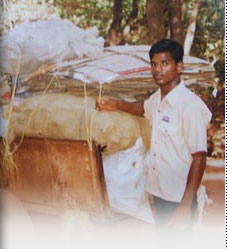The
model of Dry Waste Management of Cuffe Parade ('A'
Ward), Mumbai was
followed at Matheran 
Matheran Pictures -
1
- 2
- 3
- 4
- 5
- 6
- 7
- 8
Matheran, a popular hill station located in the State of Maharashtra,
is the smallest hill station of India with an area of about
7.25 sq. kms and local population of approx. 4,500. The annual
number of tourists is approx 2,50,000. Around 63% of Matheran
is Reserve Forest and the bungalow plots are largely forested.
The climax forests support a variety of species of flora and
are also home to a number of endangered species. This ecosystem
is extremely sensitive and given the area and other factors,
even small amounts of pressure on the ecology and environment
have enormous pressure on it. The Supreme Court declared Matheran
as eco-sensitive and the Ministry of Environment and Forests
issued a draft notification on 6 February 2002 declaring Matheran
and surrounding areas as eco-sensitive.
Course of Action:
One of the main problems of Matheran was the disposal of
solid wastes, almost entirely comprising of PET bottles and
laminates, which were thrown into the forests. ICPE took up
the initiative of presenting a solution to their waste management
problems and decided to provide help, assistance and expertise
to Matheran. Members from ICPE addressed the Municipal Councilors
on Solid Waste Management and Plastics and the Environment
which had a tremendous impact on them. The broad plan of action
was then laid down - the representative of hotelier's association
assured that all hotels would separate the plastic wastes,
the Council would have separate bins for plastics and would
conduct meetings with the local residents to garner their
support and participation. The Council also agreed to set
aside a plot where all the dry waste collected would be stored.
ICPE took up the responsibility of taking it away from there.
It was decided to approach the railways to transport the plastic
waste to Neral in the freight trains that otherwise went back
empty.
It was found that Parle products sold the most at Matheran.
Figures were obtained from Parle Bisleri and they quoted that
the average number of PET bottles supplied to Matheran was
20,000-25,000 per month. The weight of empty bottles was stated
as 1- 1 ½ tons every month. The weight of laminates
was found to be approx 500 kgs per month.
A small committee was then formed to tackle the Solid Waste
Management issues of Matheran - authorities from Matheran
Bachao Samiti (MBS), ICPE, MCGM and Bisleri. A series of meetings
were held in the Municipal Council office of Matheran to address
the Councilors, hoteliers, shop owners and the local people.
ICPE made a visit to Matheran jointly with MBS, MCGM authorities
and Bisleri in August 2002. It was seen that all the material
that went up the hill (bottled water, packaged foodstuff etc.)
was not brought down. Owing to the lack of sufficient number
of garbage bins PET bottles, laminates and other dry wastes
were littered along the railway tracks and all over the hill
(market area, tourist points etc.). Hoteliers dumped their
dry wastes in their backyards.
During the meeting with the Councilors, a broad overview was
given about ICPE and its segregation projects. The model Cuffe
parade project was also described. Leaflets, giving details
of the segregation process and the proper disposal of plastics,
were distributed. MCGM authorities provided details of vermiculture
and Advanced Locality Management (ALM). It was then proposed
that the Council members make a visit to Mumbai to study the
segregation projects and the SWM methods of MCGM for the proper
implementation of the Waste Management Project at Matheran.
It was also proposed that awareness activities be conducted
in the schools and among the local people for better understanding
of the project. Thus Matheran cleaning project started with
the help of all involved.
A review was taken in October 2002, and it was then seen
that there was a remarkable improvement in the dry waste management
of Matheran. The roads and market area were found to be litter
free. The civic sense of the local people had improved. Dry
waste was collected by the Municipal Council from all over
the hill and brought to a central location. The Council had
taken up a contract for the collection and storage of dry
waste. However, a need was felt for a proper system of disposal
of dry waste to be jointly worked out by the Municipal Council,
hotel, association, shop owners and the local people with
the initial help and guidance of ICPE.
Some practical measures were taken for easy handling of the
dry wastes, especially the PET bottles, which are light in
weight but high in volume.
Compactor Machines, which crushes the PET bottles to a thin
layer of sheet, were installed by M/s. Bisleri.
M/s. Bisleri had organized their own collection system to
take back crushed PET bottles to nearby centers for recycling.
ICPE organized other recyclers / traders to take back Plastics
and other wastes, for recycling.
Further efforts were made for handling the wet (biodegradable)
wastes for converting those to compost through vermiculture
process.
The larger hotels were advised to have their own vermiculture
pits, whereas the smaller hotels could send their wet wastes
to some common compost bins.
In November, 2002, the Expert Committee on New and Proposed
Eco Sensitive Zones, constituted by the Ministry of Environment
and Forests visited the Eco-Sensitive Zone of Matheran. After
the visit, the Chairman of the Committee, Prof. (Dr.) HY Mohan
Ram, stated that the hill station of Matheran was clean and
free of garbage. He said that he had seen all the hill station
in India, and no other hill station was as clean of garbage
as Matheran.

|

